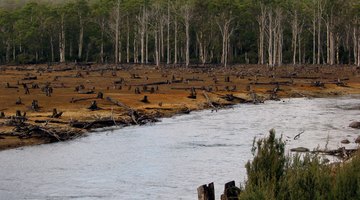"Deforestation" is any process that alters an original tree cover, including cutting all trees on a site, thinning a forest and infrequent fires. Thousands of years ago, forests and grasslands covered most of the earth. Although deforestation first became a serious concern in the 1950s, it has been an issue since humans began making fires hundreds of thousands of years ago. The extinction of plants and animals due to deforestation has occurred for thousands of years. Deforestation continues to be an increasingly serious problem, due to the world's rapidly growing population and demands on valuable resources. This problem is also accelerating. The environment is ever-more sensitive to change, and some areas of the earth are already suffering from irreversible damage.
Deforestation and Human Development
Clearing forests goes hand-in-hand with human development. Trees offer shelter and fuel for warmth and cooking. The fruit and nuts provide food, as well as medicines and dyes. Cutting down trees required no advanced technology. The earliest people could use their stone or flint axes to fell trees or fire to clear large expanses. As civilization advanced, trees were cut down first for agricultural use and then for increased urbanization. The steady growth of population in the European forests from 9000 to 5000 B.C. led to extensive land-clearing for agriculture, animal domestication and using fire for hunting game. The situation was similar for all continents, China, Africa and the Americas, with increased population over the next several millennia.
Deforestation and Industrialization
The invention of metal, saws and then power saws greatly accelerated the ability to clear land. Since the Industrial Revolution in the 1800s, forests have been exploited worldwide. According to Michael Williams in his 2001 article in "History Today," in central European Russia, for example, 67,000 square kilometers (16,556,060 acres) of forests were cleared between the end of the 17th century to the start of the 20th century. The American pioneers pushed forward into the West, and cutting trees was an integral part of everyday life. Approximately 460,000 square kilometers--an astounding 177 million square miles--of forests were felled just by 1850, and nearly 300 million square miles by 1910.
Rain Forest Deforestation
The most well-known deforestation has occurred since 1950. The softwood forests now meet the needs of today's societies. However, the severe problem is the major population explosion in the tropics. The earth's largest rain forest is located in the 1.2 billion-acre Amazon Basin that runs across nine South American countries. The basin includes a huge variety of plants and animals and thousands of different kinds of trees. The Rain Forest Preservation Society reports that only 2.7 billion acres of the original 4 billion acres of rain-forest acres remains, and hundreds of thousands of square miles are lost every year.
Slash-and-Burn Techniques
Prior to the 1960s, restrictions kept people out of the Amazon rain forest other than clearing alongside rivers. Then farmers began colonizing this tropical area with slash-and-burn techniques, which destroy the trees without using them for other needs.It also greatly diminishes the soil's nutrients and lessens the possibility of continued plant growth. The farmers can only get a few seasons of crops, and then they have to clear more trees for land. If deforestation was done in the right way and the acres rotated, the farmers could grow excellent crops for numerous years.
Results of Deforestation
Deforestation has many negative effects on the earth. Trees and plants remove and store greenhouse gases from the air, such as carbon dioxide, ozone and methane. When trees are destroyed, the greenhouse gases greatly increase global warming.
Cutting trees also destroys lifeforms. The Rain Forest Preservation Society's website reports that tropical rain forests contain over half of the world's known animal species and plants. Forested areas also help protect watersheds and prevent soil erosion, floods and landslides. Forests also feed the poor. The majority of the 1.2 billion people who live in severe poverty rely on the trees for their fundamental needs and livelihoods.
Saving the Rain Forests
Environmentalists have long voiced concern over the vanishing Amazon rain forest, but they haven't been particularly effective at slowing forest loss. Many steps have to be taken to improve today's situation. These include reducing the slash-and-burn techniques, increasing the amount of protected land, promoting and/or legislating sustainable use of forest products, and using ways of logging that reduce deforestation problems. The alternative is a major extinction, not by natural means such as a meteor landing or a volcanic eruption as in the earth's past, but by human development and not taking needed action.
Related Articles
References
Writer Bio
Sharon L. Cohen has 30-years' experience as a writer and editor. Her Atlantic Publishing book about starting a Yahoo! business is being followed by one on Amazon.com and another about starting 199 online businesses ( See http://online-business-guide.com). Clients love her excellent high-quality work. She has a B.A. from University of Wisconsin, Madison and an M.A. from Fairfield University Graduate School of Corporate and Political Communiation.











